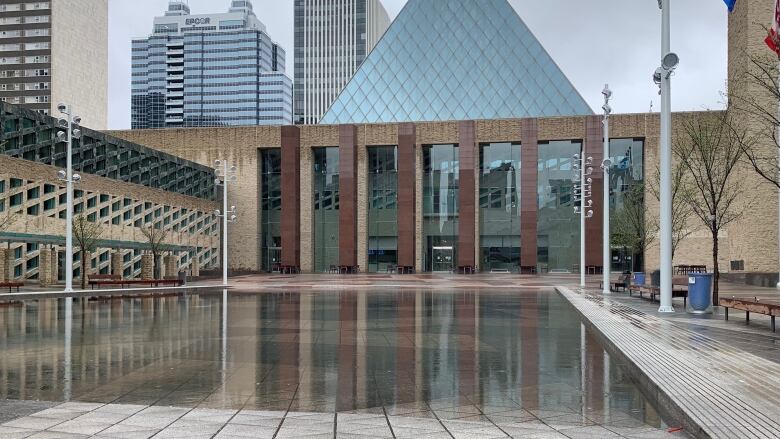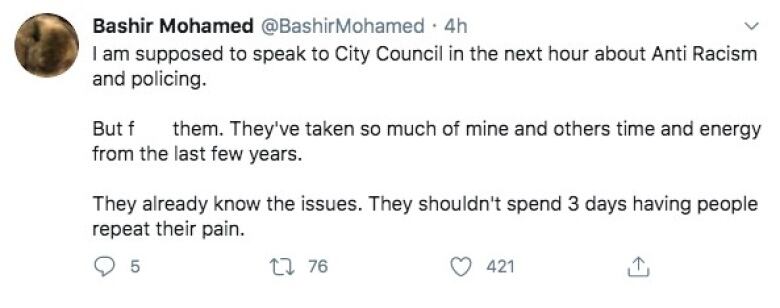'We cannot afford to wait,' anti-racism advocates tell Edmonton city council at public hearing
Other speakers urged city council to proceed with caution at a virtual public hearing about future of policing

On the first day of a virtual public hearing about the future of policing in the city, someEdmontonians called on the mayor and council to divert police funding into community programs to improve public safety.
Others, however, warned that such a plan could backfire.
With more than 80 people registered to speak, Monday's hearingwas emotional at times as city council heard from community advocates, police, business owners, lawyers, academics and former police commissioners.
The hearing follows a motion by council that is considering the possibility of freezing next year's police budget at 2020 levels and diverting some funding to programs aimed at community safety.
The motion was passed by council last week after unprecedented scrutiny on law enforcement accused of over-policing racialized communities in Edmonton in the wake of George Floyd's murder by a Minneapolis police officer.
Alex Eskandarkhah, a Black business owner, told council it would be more cost-effective for the city to redirect money from policing and equipment into mental health programs, public transit and other community services.
"The reality is the way the system is built right now, Black and Indigenous people can easily fall through the cracks and end up on the wrong side of the law," Eskandarkhah said, listing a number of issues including carding, white-washed education systems, lack of effective resources and residential segregation.
When we talk about defunding the police we don't mean abolishing or taking power away. We actually want to make your jobs easier.- Alex Eskandarkhah
"When we talk about defunding the police we don't mean abolishing or taking power away. We actually want to make your jobs easier. "
Other speakers urged city council to abolish police entirely, as elected officials are doing in Minneapolis.
But Edmonton Griesbach MP Kerry Diotte said the majority of people he hears from are opposed to cuts and want to see more money invested in policing. He cautioned his municipal counterparts not to act in haste.
"Many people are angry at all police and all people in authority," said Diotte, a former Edmonton city councillor. "So I believe this is not the time to be embarking on drastic changes in the way we do policing in the city of Edmonton."
'This is institutional racism'
Rob Houle, former acting director at the city's Indigenous relations office, said people have waited long enough for change.
"We cannot afford to wait any longer because the way the trends are, and the way the news is, police forces will never stop killing Black and brown faces until something is done to change that," said Houle.
He was one of many speakers to call for an immediate end to carding arbitrary stops where police collect and store personal information from people not suspected of a crime.
Houle who recalled his own experience in 2005, when he waspepper-sprayed and handcuffed by police and dropped at his front door without medical attention also called out the lack of diversity in the city's upper ranks.
He criticized police Chief Dale McFee's recent assertion that under current union rules, diverting millions of dollars away from police would result in the loss of the service's newest staff and most diverse hires.
"This is institutional racism," Houle said. "There's been vocalization around doing something with the bad apples. The provisions that exist only serve to protect those bad apples."
'We all have the same goal'
Bruce Phillips, an Edmonton police officer who lives in the Alberta Avenue neighbourhood, challenged one of the repeated arguments in favour of divestment, which notes that 30 per cent of calls to Edmonton police are about mental health and other social emergencies.
Phillips agreed that some calls might be better handled by a social worker or mental health nurse but said the risk is difficult to identify beforehand.
"We might end up putting the wrong people in harm's way," he said. "I absolutely understand that people are angry right now. I'm sure if I had lived their experience I would be angry too. But please let's make sure that anger isn't the impetus behind how we make policies. We all have the same goal improving our city and helping its most vulnerable citizens."
Speakers also called for complaints about police to be investigated by an independent body, compassion training for police officers, and data collection around the reason, outcome and effectiveness of police stops, searches and arrests.
In response to a question from Mayor Don Iveson asking about next steps, business owner Rebecca Blakeypointed to a resource put together by the Edmonton chapter of Black Lives Matter.
She said the group had already outlined needed changes, including disbanding the service's community engagement team, phasing out the transit peace officer program and removing police officers from public schools.
"You're asking questions that are so ill-informed and are frankly a waste of our time," Blakey said.
- Anti-carding activist shares black history with Edmonton police commission
- Edmonton city council takes steps to form advisory anti-racism committee
Advocate Bashir Mohamed chose not to address council, expressing the frustration felt by manycommunity members who say they have repeatedly laid out their concerns and volunteered their time, working with the city and police, to try to fix the problem foryears.

The public hearing is expected to go until Wednesday.












_(720p).jpg)


 OFFICIAL HD MUSIC VIDEO.jpg)
.jpg)



























































































